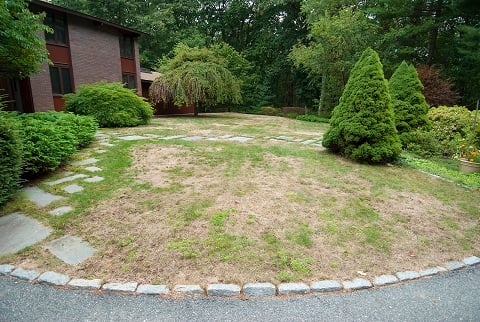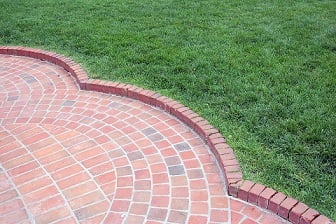Here’s what can happen if you don’t mow and water properly:
Mowing off too much of your grass at once will make your lawn look brown (because you’ve mown off the green part.)
Mowing infrequently will also make your lawn look brown because you’ll mow off too much at once (see item above.)
Mowing with a dull mower blade will make your lawn brown, because you’re tearing the grass, not cutting it. Torn grass, with ragged edges, is more susceptible to disease and insect problems. (Disease and insect problems will make your lawn look brown.)
Not watering enough, especially in high temperatures, will make your lawn look off-color and wilted because grass loses water in a process called transpiration, kind of like our perspiration. If we sweat a bunch and don’t get any water, what happens? Heatstroke! If your lawn reaches the wilty stage and still doesn’t get water, it will go dormant and turn brown.
Watering a little every day instead of watering deeply twice per week will give your grass a shallow root system that cannot be healthy or withstand drought conditions.
Please visit our “How to Mow Properly” and “How to Water Your Lawn” pages to see if you can pick up a few pointers you didn’t know about.
Now, about fertilizer. Thick, healthy turf is your best defense against weeds. Any lawn care company will tell you that. Weeds will invade a bare spot because they can. Nature always finds a way to fill in a blank spot. Thin, scraggly turf is also an invitation for weeds to come in and take over. A bad weed problem in a lawn isn’t from a lack of weed control, it’s from a lack of a thick, vigorously growing turf to give the weeds competition.
We hear “I don’t want fertilizer, because then I’ll have to mow all the time!” If you don’t want to mow, you should consider alternatives to turfgrass, because turfgrass like Bermuda needs mowing sometimes every 4 days during the growing season – if you want it to look fabulous, that is. Fertilizer is food for the grass.
If customers want weed control ONLY, we assume it’s because they know how to do their own fertilizing, and we strongly recommend they do their own fertilizing.
Just look at your brown dormant grass in the winter. If you have a lawn care company and you regularly get weed control and fertilizer applications, it will be mostly brown right now. But, nature being as it is, you’ll see some green weeds pop up either in the spring, while your grass is still dormant, or in the fall when it’s going dormant. Your soil is literally teeming with weed seeds, just waiting for a chance to germinate. Some weeds seeds can germinate after being dormant for years and years. One weed plant can put out hundreds to thousands of weed seeds. Rain, wind, and animals carry them to your lawn as well as birds that fly over and poop them out. If you have thick, healthy grass, hopefully, the weed seeds will not have room to get sunlight and germinate. Sometimes they do anyway.
And that’s the reason that weed control is ongoing – don’t expect to get one application and be weed-free the rest of the year!
Getting a green, healthy lawn is teamwork between you and your lawn care company! If you’re a full-program GreenGrass customer, and you see weeds in-between your regular applications, just give us a call and we’ll come back at no charge. And, if you’re not a GreenGrass customer, why not get a free estimate and see if we can be half of your lawn care team?
Note: I am specifically discussing warm season lawns, like bermuda and zoysia, in full sun.
If you have bare areas around trees or in other shady areas, you will need to seed fescue in those areas in the fall.

If you want to know how to get the best lawn in the neighborhood this year, look no further.
First of all, a good lawn care company, like GreenGrass Lawn Care, is a great start. We apply pre-emergent weed control, post-emergent weed control, liquid aeration, and fertilizer to keep your lawn healthy
Yes, there’s mowing and watering but “What about weed control?”. Believe it or not, fertilizer, and mowing, and watering properly are just as important to weed control as weed control applications are.
We treat a lot of lawns, and the most common problems we see on lawns that aren’t performing well are improper mowing and watering practices.

